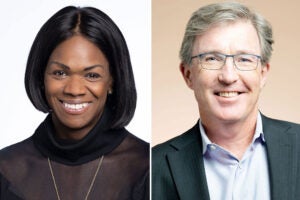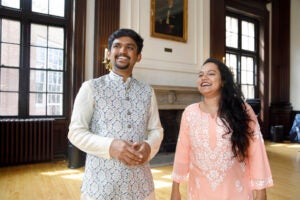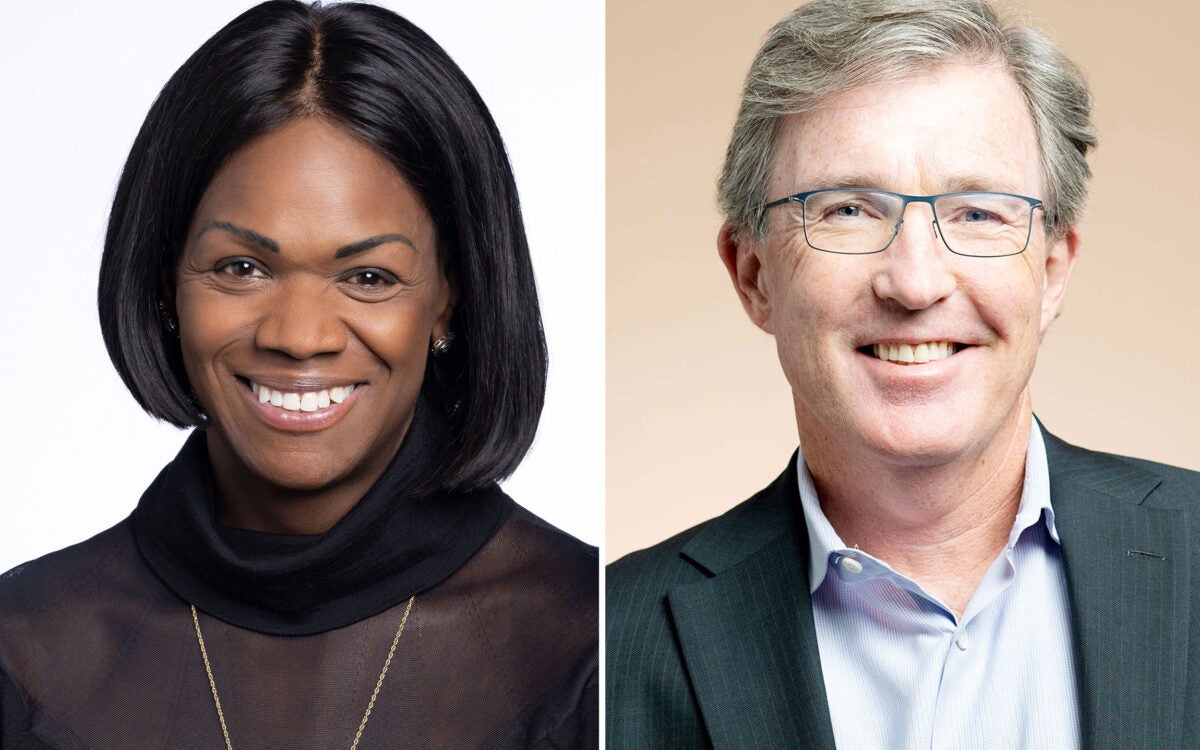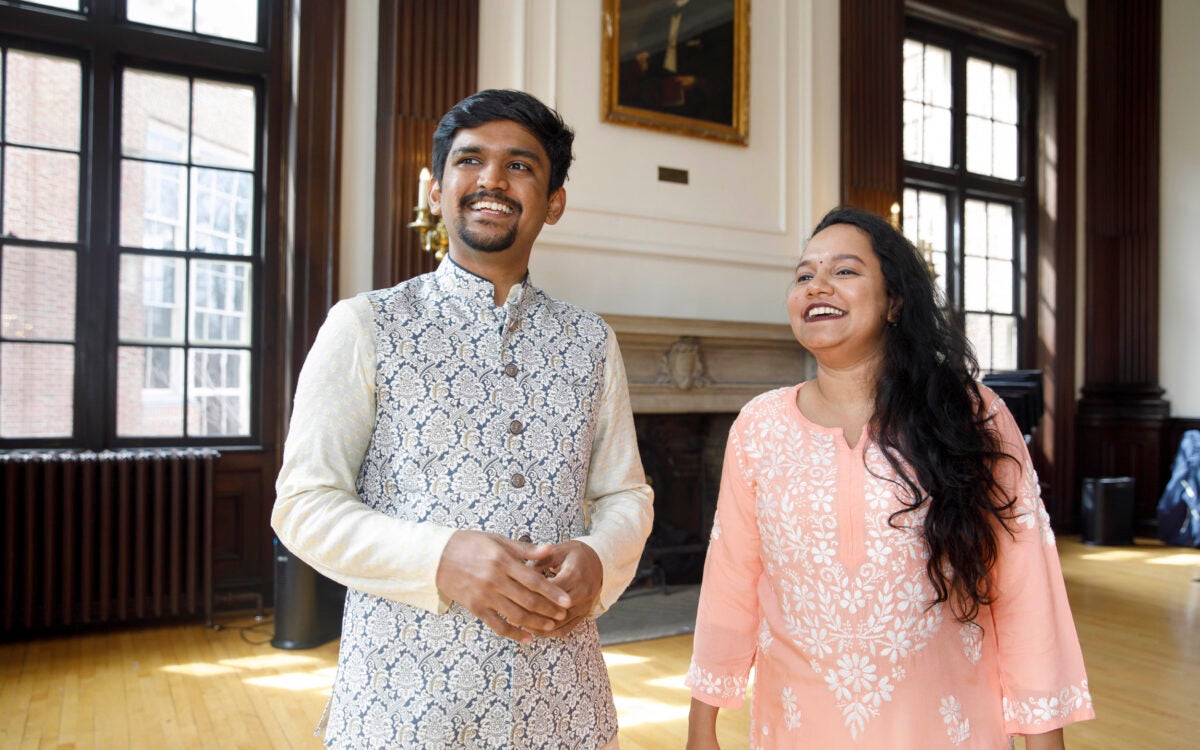David Rockefeller gives $100 million for Harvard undergraduate programs
Largest gift from an alumnus in Harvard’s history
David Rockefeller, a member of the Harvard College Class of 1936 and longtime University benefactor, has pledged $100 million to increase learning opportunities dramatically for Harvard undergraduates through international experiences and participation in the arts. Rockefeller’s gift is the largest from an alumnus in Harvard’s history.
“Harvard opened my eyes and my mind to the world,” Rockefeller said. “It was because of Harvard’s language requirement that I spent the summer of 1933 in Germany and saw firsthand the ominous rise of fascism. And it was at Harvard that I first studied art history. Harvard provided me with an intellectual framework to understand what I was seeing and experiencing that has stayed with me for my entire life. I have enjoyed working with President Faust in structuring this gift and I support her vision for Harvard’s future. In that context, I hope my gift will help enable future Harvard undergraduates to experience similar opportunities to learn about the world in which they live.”
“This is a magnificent act of generosity from an extraordinary friend of Harvard,” said Drew Faust, president of Harvard University and Lincoln Professor of History. “Our students stand to benefit immeasurably from greater opportunities to experience other cultures and to engage with the arts. Harvard has had occasion to thank David Rockefeller many times before, but never more so than today, for his profound commitment to learning experiences that hold the promise to transform people’s lives.”
Approximately $70 million of the gift will enable undergraduates to learn about other cultures directly by participating in high-quality international experiences, which may include study for credit, internships, service, work, research, or travel. Rockefeller has designated $30 million of his gift to provide hands-on learning opportunities in the arts.
As a cornerstone of the recently announced effort to renovate the Fogg Art Museum, the arts component of Rockefeller’s gift will enable the construction of three new study centers in which undergraduates will have personal encounters with original works of art. These study centers – representing the University’s three main collections of the Fogg, Busch-Reisinger, and Sackler museums – will allow Harvard to add interaction with works of art to the undergraduate curriculum. Since there are more than 260,000 objects in the collection, students will have direct access to a variety of works in an exciting and suitable setting.
The gift’s international component will provide annual stipends for experiences abroad to hundreds of undergraduates who might not otherwise be able to afford to participate. Rockefeller’s gift will also enhance the capacity of the Office of International Programs and other offices, such as the Office of Career Services, to expand their ability to serve both faculty and students by offering robust advising and a support framework for new program development. The gift will also establish the President’s Innovation Fund for International Experience, which will provide funding at the president’s discretion for innovative undergraduate programming suggested by Harvard’s international centers and professional schools.
Last year, 1,450 Harvard undergraduates participated in international experiences, more than double the 667 students who took part just four years earlier. Still, a recent survey of graduating seniors indicated that many did not take part in such experiences because of financial constraints.
“Internationalism permeates Harvard,” said Michael D. Smith, dean of the Faculty of Arts and Sciences and Gordon McKay Professor of Computer Science and Electrical Engineering. “Increasingly, our society is grappling with issues of global significance, and enabling our undergraduates to incorporate international experiences into their study is thus more important than ever. This generous gift greatly enhances our efforts to build our study abroad programs around the incredible educational value of living and learning while immersed in another culture,” he said.
In addition, a portion of Rockefeller’s gift will provide Faust with valuable seed money to fund recommendations made by the University-wide Arts Task Force, which she formed last November. Chaired by Cogan University Professor Stephen Greenblatt, the task force draws its membership from faculty, students, and others across the University who represent many fields and modes of engagement with the study and practice of the arts. Their recommendations might include expanding a program designed to recognize and support talented student artists in the practice of their craft; launching artist-in-residence programs; or developing courses and international experiences using works of art as the basis for historical, anthropological, and cultural exploration.
Rockefeller has previously given $40 million in gifts to Harvard, including $25 million to create the David Rockefeller Center for Latin American Studies. Established with Rockefeller’s initial grant in 1994, the David Rockefeller Center for Latin American Studies has become one of the pre-eminent institutions of its kind in the world. In May 2006, he made his most recent gift to the center of $10 million. The center is distinguished as the first interfaculty initiative for international studies at Harvard. More than 70 leading scholars from the Faculty of Arts and Sciences and eight of the University’s graduate and professional schools serve on the center’s policy committee.
Harvard has retained the internationally renowned architect Renzo Piano to design the Fogg Art Museum’s renovation. While construction dates are contingent on the community approval process, Harvard hopes that work will begin sometime in 2009.
“Students and scholars come from around the world to learn from works of art in our collections,” said Thomas W. Lentz, Elizabeth and John Moors Cabot Director of the Harvard University Art Museums. “This will help to create a new intellectual and visual dimension for future generations at Harvard, especially for our undergraduates, by dramatically increasing our ability to make these works accessible. This is an extraordinary gift to those scholars,” he said.
Rockefeller has enjoyed seeing the programmatic impact of his previous gifts. “The center has more than fulfilled my expectations, and has played an important role in helping Harvard transform itself from a U.S. institution with an international reputation into a truly global university,” Rockefeller said. “Latin America is a critical part of the world, and understanding the changes occurring there is essential. I trust that the center will continue to be a leader in Latin American studies far into the future.”
Rockefeller’s desire to leverage his giving has been rewarded at the center many times over. For example, his initial gifts to the center, which provided endowments for three chairs in Latin American studies, have inspired other donors, and Harvard now benefits from seven endowed professorships dedicated to the study of Latin America. In addition, eight endowed fellowships for visiting researchers now enrich the Harvard community each year.
Working closely with Rockefeller to help take the center from vision to reality was then-President Neil L. Rudenstine. Rudenstine recognized that studying a region such as Latin America would best be achieved by engaging scholars from numerous fields and from many of Harvard’s schools. He found himself immediately attracted to Rockefeller’s idea.
“In the early 1990s, David Rockefeller had the vision to help lead Harvard’s effort in creating the first university-wide center of its kind,” said Rudenstine. “David realized that the time was right to turn attention – in a much more powerful and concentrated way – on Latin American affairs. The goal was to involve Harvard faculty and students from all the professional schools – as well as the Faculty of Arts and Sciences – to collaborate with colleagues and students throughout Latin America on a wide range of new initiatives. Since then, there have been hundreds of joint projects in research and education, as well as a full program of lectures, conferences, cultural events, and other activities. The David Rockefeller Center has quickly become a major educational presence throughout the Americas, and has, in addition, been an influential model for other university-wide international centers, not only at Harvard, but at other institutions in the United States and abroad,” he said.
The research grants given to faculty by the David Rockefeller Center for Latin American Studies have supported work on ways to reduce inequalities in access to good schools, health care, and affordable housing; reduce air pollution and protect the environment; strengthen democratic institutions; and improve U.S.-Latin American relations. The center has published a dozen books on such topics as the effectiveness of free trade agreements, the Cuban economy, and the role of social enterprise throughout the region. The center, in conjunction with the Inter-American Development Bank, also publishes books on economic development.
Rockefeller is the former chairman, president, chairman of the executive committee, and CEO of Chase Manhattan Bank, and former chairman of the board of the Rockefeller Group. He is known as an innovative philanthropist with a wide range of interests, including Latin America, modern art, and the sciences. He has been a generous donor to many of Harvard’s faculties and schools. A past member of the Executive Committee of the Committee on University Resources (COUR), he also served as honorary chair of The University Campaign, which raised a record $2.6 billion for Harvard between 1994 and 1999. He has been a generous donor to the Museum of Modern Art, Rockefeller University, and numerous other institutions and causes. An active Harvard alumnus for decades, he served on the Board of Overseers from 1954 to 1966, and was president of the board from 1966 to 1968. In recognition of his many forms of service to the University, he received an honorary degree in 1969.




